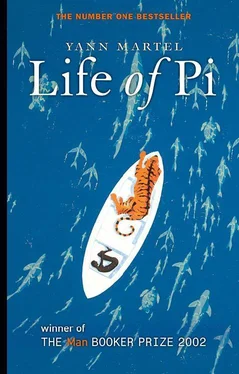Yann Martel - Life of Pi
Здесь есть возможность читать онлайн «Yann Martel - Life of Pi» весь текст электронной книги совершенно бесплатно (целиком полную версию без сокращений). В некоторых случаях можно слушать аудио, скачать через торрент в формате fb2 и присутствует краткое содержание. Год выпуска: 2002, ISBN: 2002, Издательство: Canongate Books, Жанр: Современная проза, на английском языке. Описание произведения, (предисловие) а так же отзывы посетителей доступны на портале библиотеки ЛибКат.
- Название:Life of Pi
- Автор:
- Издательство:Canongate Books
- Жанр:
- Год:2002
- ISBN:9781847674210
- Рейтинг книги:3 / 5. Голосов: 1
-
Избранное:Добавить в избранное
- Отзывы:
-
Ваша оценка:
- 60
- 1
- 2
- 3
- 4
- 5
Life of Pi: краткое содержание, описание и аннотация
Предлагаем к чтению аннотацию, описание, краткое содержание или предисловие (зависит от того, что написал сам автор книги «Life of Pi»). Если вы не нашли необходимую информацию о книге — напишите в комментариях, мы постараемся отыскать её.
Life of Pi — читать онлайн бесплатно полную книгу (весь текст) целиком
Ниже представлен текст книги, разбитый по страницам. Система сохранения места последней прочитанной страницы, позволяет с удобством читать онлайн бесплатно книгу «Life of Pi», без необходимости каждый раз заново искать на чём Вы остановились. Поставьте закладку, и сможете в любой момент перейти на страницу, на которой закончили чтение.
Интервал:
Закладка:
When your animal appears good and sick, you can stop. Seasickness comes on quickly, but it takes a long while to go away. You don’t want to overstate your case. No one dies of nausea, but it can seriously sap the will to live. When enough is enough, stream the sea anchor, try to give shade to your animal if it has collapsed in direct sunlight, and make sure it has water available when it recovers, with anti-seasickness tablets dissolved in it, if you have any. Dehydration is a serious danger at this point. Otherwise, retreat to your territory and leave your animal in peace. Water, rest and relaxation, besides a stable lifeboat, will bring it back to life. The animal should be allowed to recover fully before going through steps 1 to 8 again.
Treatment should be repeated until the association in the animal’s mind between the sound of the whistle and the feeling of intense, incapacitating nausea is fixed and totally unambiguous. Thereafter, the whistle alone will deal with trespassing or any other untoward behaviour. Just one shrill blow and you will see your animal shudder with malaise and repair at top speed to the safest, furthest part of its territory. Once this level of training is reached, use of the whistle should be sparing.
CHAPTER 72
In my case, to protect myself from Richard Parker while I trained him, I made a shield with a turtle shell. I cut a notch on each side of the shell and connected them with a length of rope. The shield was heavier than I would have liked, but do soldiers ever get to choose their ordnance?
The first time I tried, Richard Parker bared his teeth, rotated his ears full round, vomited a short guttural roar and charged. A great, full-clawed paw rose in the air and cuffed my shield. The blow sent me flying off the boat. I hit the water and instantly let go of the shield. It sank without a trace after hitting me in the shin. I was beside myself with terror—of Richard Parker, but also of being in the water. In my mind a shark was at that very second shooting up for me. I swam for the raft in frantic strokes, precisely the sort of wild thrashing that sharks find so deliciously inviting. Luckily there were no sharks. I reached the raft, let out all the rope and sat with my arms wrapped around my knees and my head down, trying to put out the fire of fear that was blazing within me. It was a long time before the trembling of my body stopped completely. I stayed on the raft for the rest of that day and the whole night. I did not eat or drink.
I was at it again next time I caught a turtle. Its shell was smaller, lighter, and made for a better shield. Once more I advanced and started stamping on the middle bench with my foot.
I wonder if those who hear this story will understand that my behaviour was not an act of insanity or a covert suicide attempt, but a simple necessity. Either I tamed him, made him see who was Number One and who was Number Two—or I died the day I wanted to climb aboard the lifeboat during rough weather and he objected.
If I survived my apprenticeship as a high seas animal trainer, it was because Richard Parker did not really want to attack me. Tigers, indeed all animals, do not favour violence as a means of settling scores. When animals fight, it is with the intent to kill and with the understanding that they may be killed. A clash is costly. And so animals have a full system of cautionary signals designed to avoid a showdown, and they are quick to back down when they feel they can. Rarely will a tiger attack a fellow predator without warning. Typically a head-on rush for the adversary will be made, with much snarling and growling. But just before it is too late, the tiger will freeze, the menace rumbling deep in its throat. It will appraise the situation. If it decides that there is no threat, it will turn away, feeling that its point has been made.
Richard Parker made his point with me four times. Four times he struck at me with his right paw and sent me overboard, and four times I lost my shield. I was terrified before, during and after each attack, and I spent a long time shivering with fear on the raft. Eventually I learned to read the signals he was sending me. I found that with his ears, his eyes, his whiskers, his teeth, his tail and his throat, he spoke a simple, forcefully punctuated language that told me what his next move might be. I learned to back down before he lifted his paw in the air.
Then I made my point, feet on the gunnel, boat rolling, my single-note language blasting from the whistle, and Richard Parker moaning and gasping at the bottom of the boat.
My fifth shield lasted me the rest of his training.
CHAPTER 73
My greatest wish—other than salvation—was to have a book. A long book with a never-ending story. One I could read again and again, with new eyes and a fresh understanding each time. Alas, there was no scripture in the lifeboat. I was a disconsolate Arjuna in a battered chariot without the benefit of Krishna’s words. The first time I came upon a Bible in the bedside table of a hotel room in Canada, I burst into tears. I sent a contribution to the Gideons the very next day, with a note urging them to spread the range of their activity to all places where worn and weary travellers might lay down their heads, not just to hotel rooms, and that they should leave not only Bibles, but other sacred writings as well. I cannot think of a better way to spread the faith. No thundering from a pulpit, no condemnation from bad churches, no peer pressure, just a book of scripture quietly waiting to say hello, as gentle and powerful as a little girl’s kiss on your cheek.
At the very least, if I had had a good novel! But there was only the survival manual, which I must have read ten thousand times over the course of my ordeal.
I kept a diary. It’s hard to read. I wrote as small as I could. I was afraid I would run out of paper. There’s not much to it. Words scratched on a page trying to capture a reality that overwhelmed me. I started it a week or so after the sinking of the Tsimtsum . Before that I was too busy and scattered. The entries are not dated or numbered. What strikes me now is how time is captured. Several days, several weeks, all on one page. I talked about what you might expect: about things that happened and how I felt, about what I caught and what I didn’t, about seas and weather, about problems and solutions, about Richard Parker. All very practical stuff.
CHAPTER 74
I practised religious rituals that I adapted to the circumstances—solitary Masses without priests or consecrated Communion hosts, darshans without murtis, and pujas with turtle meat for prasad, acts of devotion to Allah not knowing where Mecca was and getting my Arabic wrong. They brought me comfort, that is certain. But it was hard, oh, it was hard. Faith in God is an opening up, a letting go, a deep trust, a free act of love—but sometimes it was so hard to love. Sometimes my heart was sinking so fast with anger, desolation and weariness, I was afraid it would sink to the very bottom of the Pacific and I would not be able to lift it back up.
At such moments I tried to elevate myself. I would touch the turban I had made with the remnants of my shirt and I would say aloud, “THIS IS GOD’S HAT!”
I would pat my pants and say aloud, “THIS IS GOD’S ATTIRE!”
I would point to Richard Parker and say aloud, “THIS IS GOD’S CAT!”
I would point to the lifeboat and say aloud, “THIS IS GOD’S ARK!”
I would spread my hands wide and say aloud, “THESE ARE GOD’S WIDE ACRES!”
I would point at the sky and say aloud, “THIS IS GOD’S EAR!”
And in this way I would remind myself of creation and of my place in it.
But God’s hat was always unravelling. God’s pants were falling apart. God’s cat was a constant danger. God’s ark was a jail. God’s wide acres were slowly killing me. God’s ear didn’t seem to be listening.
Читать дальшеИнтервал:
Закладка:
Похожие книги на «Life of Pi»
Представляем Вашему вниманию похожие книги на «Life of Pi» списком для выбора. Мы отобрали схожую по названию и смыслу литературу в надежде предоставить читателям больше вариантов отыскать новые, интересные, ещё непрочитанные произведения.
Обсуждение, отзывы о книге «Life of Pi» и просто собственные мнения читателей. Оставьте ваши комментарии, напишите, что Вы думаете о произведении, его смысле или главных героях. Укажите что конкретно понравилось, а что нет, и почему Вы так считаете.












